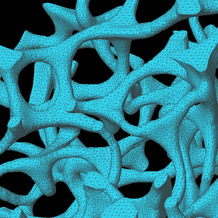
Finite element mesh
Queen's Award for Exeter spin-out
Simpleware, a company set up to commercialise EPSRC-supported research at the University of Exeter, has won The Queen’s Award for Enterprise in the International Trade Category.
The award recognises the company’s growth in overseas earnings and builds on its 2012 success when it won The Queen’s Award in the Innovation category.
Founded in 2003 by Professor Philippe Young, the company’s pioneering software converts 3D image data into high-quality computer models used for engineering design and simulation. The technology has been applied across a host of disciplines and industries – from mobile phones to car engines; asphalt damage to back pain, contact lenses to hearing aids.
The software is underpinned by patented techniques developed and improved with the aid of EPSRC funding to produce a previously unattainable level of realism in 3D simulations.
Since 2008, Simpleware's exports have seen overseas sales growth of 690 percent. The company’s global export markets include the USA, Germany, Japan, France, China, Australia, Canada and other EU countries. Strong re-selling networks are also being established in India, Taiwan, and Singapore. The majority of sales are to blue-chip companies, research institutes and universities world-wide, including NASA and the US Naval Research Laboratory.
Professor Young, says: "The ability to generate robust and accurate numerical models from various sources of image data has started a revolution in the world of multi-physics simulation.
"The level of accuracy now possible is allowing us to more closely replicate what is happening in the real world and is ultimately opening doors for the research to progress even further. This award is the icing on the cake after several years of strong growth."
Date: 7 May 2013
